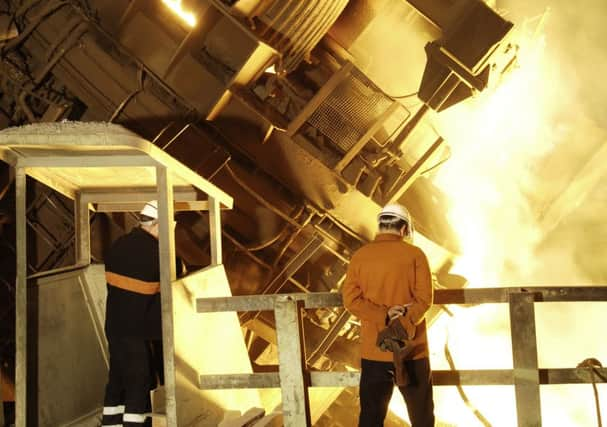European plan to save steel industry


The commission has proposed measures to strengthen the EU’s defence against ‘unfair trade practices’ and take action to ‘guarantee’ the competitiveness of energy-intensive industries.
It says the sector’s ‘serious challenges’ are ‘fuelled by global overcapacity, a dramatic increase of exports and an unprecedented wave of unfair trading’.
Advertisement
Hide AdAdvertisement
Hide AdLast week, Outokumpu in Sheffield announced plans to cut 50 jobs and close its pension scheme as it battles to prevent UK operations which employ 550 people - all based in the city - from being shut down altogether.
Tata steel has shed 550 jobs in South Yorkshire since August.
Commission vice-president Jyrki Katainen said it had imposed a ‘record’ 37 anti-dumping and anti-subsidy measures, including 16 on steel imports from China.
But he urged member states - including the UK - to act together.
Advertisement
Hide AdAdvertisement
Hide AdHe added: “We will take steps to further streamline our procedures but member states must also act together and urgently adopt our legislative proposal to modernise EU trade defence instruments and make fairer trade a reality.”
The removal of the so-called ‘lesser duty’ rule in certain circumstances would allow higher anti-dumping duties, he added.
The commission also aimed to tackle global overcapacity with the EU’s main partners including China, Japan, India, Russia, Turkey and the United States.
He also urged industry to make full use of European funding to modernise, including the €315 billion European Fund for Strategic Investments and EU structural and investment funds.
Advertisement
Hide AdAdvertisement
Hide AdMeanwhile, revised state aid rules provided “ample” opportunities for member states to support cross-border technology, research and innovation and renewable energy schemes.
Mr Katainen added: “The steel industry in Europe is world-leading in certain product segments, represents 1.3 per cent of EU GDP and provided around 328,000 jobs in 2015.
“It is also an important source of indirect employment, since it plays a significant role for many other industrial sectors such as the automotive industry.
“Despite the potential of the European steel sector and the significant efforts made to innovate and modernise, its competitive position on the global steel market has deteriorated in recent years.
Advertisement
Hide AdAdvertisement
Hide Ad“Excess production of steel in third countries such as China has increased exports, depressed prices and given rise to an unprecedented wave of unfair trading practices, distorting the global level playing field.
“The current challenges for the steel industry are serious, but they can be overcome if all players work together in a spirit of sincere co-operation.
“The Commission will continue to monitor the situation closely and stands ready to put forward additional measures, as necessary. There is no time to lose to preserve sustainable jobs and growth in Europe.”
Dave Hulse, GMB national officer, said: “GMB supports the principle of the European Commission Report.
Advertisement
Hide AdAdvertisement
Hide Ad“The steel industry has been left in a crisis and we welcome any report that calls for a level playing field for GMB and UK steel workers.
Due to record levels of steel dumping, GMB are saying market economy status must not be granted to China.
“The UK Government will likely try to block attempts to stop Chinese steel dumping after a Budget that didn’t once mention any support for steel workers or other vital UK manufacturing Industries. It demonstrates that this government just does not care about the manufacturing industry.”